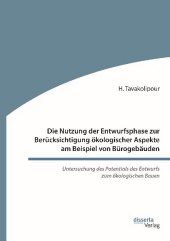 Neuerscheinungen 2019Stand: 2020-02-01 |
Schnellsuche
ISBN/Stichwort/Autor
|
Herderstraße 10
10625 Berlin
Tel.: 030 315 714 16
Fax 030 315 714 14
info@buchspektrum.de |

H. Tavakolipour
Die Nutzung der Entwurfsphase zur Berücksichtigung ökologischer Aspekte am Beispiel von Bürogebäuden
Untersuchung des Potentials des Entwurfs zum ökologischen Bauen. Dissertationsschrift
2019. 264 S. 88 Abb. 220 mm
Verlag/Jahr: DISSERTA 2019
ISBN: 3-9593548-7-8 (3959354878)
Neue ISBN: 978-3-9593548-7-5 (9783959354875)
Preis und Lieferzeit: Bitte klicken
Eines der beherrschenden Themen der letzten Jahre und Jahrzehnte, sowohl in der Politik als auch der Wissenschaft, ist das Thema Umwelt. Die Bedeutung des Bauens als direkter Eingriff in die Natur und dessen Folgen für die Umwelt führen unausweichlich zu einer Verpflichtung aller Akteure, neue Wege zu gehen. Bereits Mitte der 1990er entwickelte der Autor die Überzeugung, dass dieser Verpflichtung nur durch Bauen mit ökologischem Hintergrund nachgekommen werden kann und dass zukunftsfähiges Bauen und die Architektur unserer Zeit auf Grundlagen der Ökologie entwickelt werden müssen.
Für seine hier vorliegende Dissertation entwickelte H. Tavakolipour daher sowohl eine neue wissenschaftliche Methode als auch ökologische Grundlagen für das Entwerfen von Bürogebäuden. Die zentralen Themen der Dissertation sind dabei das Potential, der Einfluss und die Wirkung des Entwurfs auf ökologische Werte von Gebäuden.
Obgleich die Dissertation aus dem Jahre 2003 stammt, sind die hierin genannten Erkenntnisse auch heute noch aktuell und von zentraler Bedeutung.
One of the dominant themes of recent years and decades, both in politics and science, is the environment. The importance of building as a direct intervention in nature and its consequences for the environment inevitably leads to an obligation on all actors to break new ground. Already in the mid-1990s, the author developed the conviction that this obligation can only be fulfilled by building with an ecological background and that sustainable building and the architecture of our time must be developed on the basis of ecology.
For his dissertation, H. Tavakolipour developed a new scientific method as well as ecological bases for the design of office buildings. The central topics of the dissertation are the potential, the influence and the effect of the design on ecological values of buildings.
Although the dissertation dates from 2003, the findings are still relevant and of central importance today.
H. Tavakolipour wurde in Hamadan/Iran geboren und erwarb folgende Abschlüsse: Architektur und Stadtplanung an der HFBK Hamburg, Stadtökologie und Ökologische Planung an der TUHH-Harburg, Architektur mit Schwerpunkt Ökologie, Entwerfen und Konstruktion an der Universität Hannover, Bauökologie und Grundlagen des Ökologischen Bauens an der Bauhaus-Universität Weimar. Seine Dissertation zum Thema "Die Nutzung der Entwurfsphase zur Berücksichtigung ökologischer Aspekte am Beispiel von Bürogebäuden - Untersuchung des Potentials des Entwurfs zum ökologischen Bauen" verfasste er an der Bauhaus-Universität Weimar.
Der Autor war jahrelang als freischaffender Architekt in Hamburg tätig und ist Gründer der Institution für Stadt- und Bauökologie Hamburg. Er veröffentlichte mehrere wissenschaftliche Publikationen in den Bereichen Ökologie, Energie und Technologie. Er ist zudem Erfinder und Patentinhaber von zwei Fassadensystemen für solare Energienutzung in Deutschland.
H. Tavakolipour was bor
n in Hamadan/Iran and obtained the following degrees: Architecture and Urban Planning at the HFBK Hamburg, Urban Ecology and Ecological Planning at the TUHH-Harburg, Architecture with focus on Ecology, Design and Construction at the University of Hannover, Building ecology and basics of Ecological Construction at the Bauhaus University Weimar. He wrote his dissertation on the topic "The use of the design phase for consideration of ecological aspects on the example of office buildings - study of the potential of the design for ecological building" at the Bauhaus University Weimar. The author was an independent architect for years and the founder of the institution for urban and building ecology Hamburg. He has several scientific publications in the fields of ecology, energy and technology. He is also an inventor and patentee of two facade systems for solar energy use in Germany.


